商务英语7-12单元听力文本
- 格式:doc
- 大小:96.60 KB
- 文档页数:5
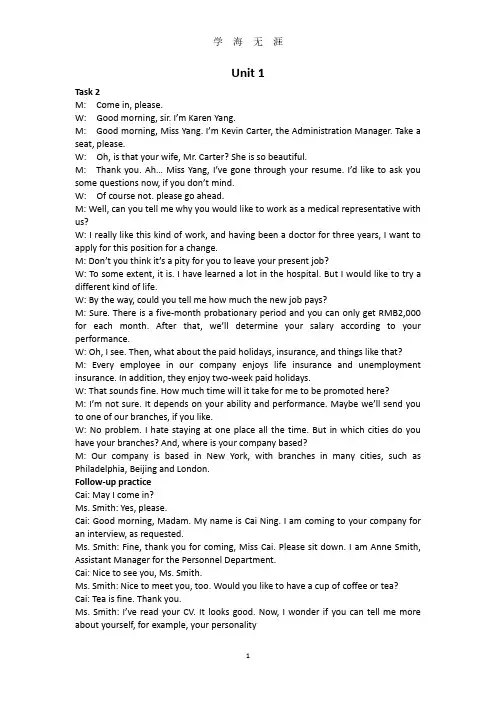
Unit 1Task 2M: Come in, please.W: Good morning, sir. I’m Karen Yang.M: Good morning, Miss Yang. I’m Kevin Carter, the Administration Manager. Take a seat, please.W: Oh, is that your wife, Mr. Carter? She is so beautiful.M: Thank you. Ah… Miss Yang, I’ve gone through your resume. I’d like to ask you some questions now, if you don’t mind.W: Of course not. please go ahead.M: Well, can you tell me why you would like to work as a medical representative with us?W: I really like this kind of work, and having been a doctor for three years, I want to apply for this position for a change.M: Don’t you think it’s a pity for you to leave your present job?W: To some extent, it is. I have learned a lot in the hospital. But I would like to try a different kind of life.W: By the way, could you tell me how much the new job pays?M: Sure. There is a five-month probationary period and you can only get RMB2,000 for each month. After that, we’ll determine your salary according to your performance.W: Oh, I see. Then, what about the paid holidays, insurance, and things like that? M: Every employee in our company enjoys life insurance and unemployment insurance. In addition, they enjoy two-week paid holidays.W: That sounds fine. How much time will it take for me to be promoted here?M: I’m not sure. It depends on your ability and performance. Maybe we’ll send you to one of our branches, if you like.W: No problem. I hate staying at one place all the time. But in which cities do you have your branches? And, where is your company based?M: Our company is based in New York, with branches in many cities, such as Philadelphia, Beijing and London.Follow-up practiceCai: May I come in?Ms. Smith: Yes, please.Cai: Good morning, Madam. My name is Cai Ning. I am coming to your company for an interview, as requested.Ms. Smith: Fine, thank you for coming, Miss Cai. Please sit down. I am Anne Smith, Assistant Manager for the Personnel Department.Cai: Nice to see you, Ms. Smith.Ms. Smith: Nice to meet you, too. Would you like to have a cup of coffee or tea? Cai: Tea is fine. Thank you.Ms. Smith: I’ve read your CV. It looks good. Now, I wonder if you can tell me more about yourself, for example, your personalityCai: Well, I think I’m a serious-minded girl, I’m calm and I don’t panic in a crisis. I like jokes and have a good sense of humor. And I also enjoy working with all kinds of people. I can even get along with people who are bad-tempered or something like that.Ms. Smith: Well, then, what do you consider your strengths and weakness?Cai: Strengths and weakness? Well, I think my ability to work with all types of people is a particular strength.Ms. Smith: Yes.Cai: My weakness? Er, I’m a little bit perfectionist. I’m quite often dissatisfied with w hat I’ve done. I always think I can do it better or in a different way.Ms. Smith: I wouldn’t call that a weakness. I’d call that a strength.Cai: Well, apart from that, I suppose sometimes I am not patient enough.Ms. Smith: Now, can you tell me about your past experience?Cai: I have six years’ financial industry experience, working for several companies. For the past two years, I have been working in an investment bank.Ms. Smith: What qualifications have you had for this position?Cai: I graduated from Peking University in 2001, majoring in accounting. I can speak fluent English and I can deal with bookkeeping and accounting in English quite well. Ms. Smith: Why did you leave your last position?Cai: I want to find a job that is challenging, where I can grow.Ms. Smith: Now, is there anything else you’d like to ask me?Cai: Yes, if I get this job with HDC, would I be able to work abroad in one of your overseas branches?Ms. Smith: Oh, yes, certainly. Our staff regularly does six-month placements in other branches.Cai: Oh, that’s great.Ms. Smith: Right, time is pressing, I’m afraid, so thank you very much for coming to see me and we’ll be in touch with you before the end of the week.Cai: thank you for seeing me.Ms. Smith: Goodbye.Cai: Bye.Video 1Chen = C. Ms. Mandel = M.C: Good morning, Ms. Mandel.M: Good morning. Sit down, please.C: Thank you.M: You are Chen Bo, aren’t you? I’m Cathy Mandel, Director of the HR Department. C: Yes, I’m Chen Bo. Nice to meet you, Ms. Mandel.M: Nice to meet you, too. I’ve gone through your resume and would like to know more about you.C: Thank you for your interest in me.M: To start with, would you like to tell me a bit about yourself?C: Sure, I’m a senior student at Guangdong University of Fina nce. I expect to graduate this summer. My major is international finance.M: So, why did you choose our company?C: As far as I know, your company is one of several leading international consultant corporations which came to China after China entered WTO. I think working here would give me the best chance to use what I’ve learned at university.M: As a major in international finance, what do you think you can do in consultancy? C: Well, I know how to tackle problems. For example, I know I must fist analyze the problem and work out its major cause. Then I will be able to search for ways to solve it from the available data.M: Sometimes data is not enough. Have you got any relevant experience in this field? C: Last year, during the probationary period, I was involved in the restoration of a factory in Nanjing. I really learned a lot from the experience, especially how to assess people’s strengths and abilities.M: Can you cope with hard work under pressure and in a tough environment?C: No problem. I don’t care about pressure or the environment as long as I enjoy the work.M: Good. Now, do you have any questions to ask?C: Yes, I’ve got one. Are there any opportunities for Chinese employees to be transferred to the head office in New York or other branch offices around the world? M: Um, probably. I think you are likely to be sent to work in an overseas branch to get experience later on once you’ve proved your worth.C: Oh, great. If I’m accepted, I will do my best for the company.M: I wish you luck! We’ll notify you of our final decision by Friday.C: Thank you, Ms. Mandel. Goodbye.M: Goodbye.Video 2Wang = W, Mr. White = M.W: May I come in?M: Yes, please do.W: Good morning, sir. My name is Merry Wang. I’ve come for an interview, as requested.M: Nice to meet you, Miss Wang. I am Harry White, Director of the HR Department. I was expecting you. Please, take a seat.W: Thank you.M. Well, Miss Wang, you are applying for the position of Sales manager, right? How did you know about our company?W: I got to know your company from your TV commercials. They are elaborately designed and produced, and leave me deep impression. And in the summers of 1997 and 1998 I worked as a salesgirl for your company in GZ.M: Really? That’s good. Then you must know something about our company?W: Yes, a little. Your company is very famous. Your cosmetics and skincare products are very popular with women all over the world.M: Huh, that’s right. Miss Wang, can you tell me which university you attended? W: Sun Yat-sen.M: And what degree have you got?W: I have a bachelor’s degree in business administration.M: How is your English? You know, some staff members in our company are Americans, so conversational English is very important.W: I passed TEM8 at college, and I am good at oral English. I think I can communicate with Americans quite well.M: Good. I know you are now with United Butter. What is your chief responsibility there?W: I’ve worked there for five years, since I graduated from college. Two years ago, I was appointed Brand Manager – responsible for the Panda line of biscuits.M: Why do you want to change your job?W: I want to change my work environment, seek new challenges and broaden my experience. That’s why I want to move into sales.M: What do you think is the most important qualification for a salesperson?W: I think it’s self-confidence and quality products.M: I agree with you. What salary would you expect to get here?W: well, I would leave it to you to decide after you consider my abilities. My current annual income at United Butter is 150 thousand. But, er, … could you tell me a little more about what the job entails?M: You would be in charge of all the sales activities, for all hair products in northeast China. This would involve market analysis, client service and development, sales promotion, and regular customer satisfaction surveys. You’d report directly to the Regional Sales Director. Do you have any other questions?W: Yes, only one. When can I have your decision?M: I need to discuss with other board members. We’ll notify you of our decision as soon as possible. But … to be honest, you seem to be a good candida te with the right kind of experience and personality. You’re high on my list.W: That’s good! Thank you, Mr. White. I look forward to hearing from you. Goodbye. M: Goodbye.Case AnalysisInterviewer: Where do you see yourself in three years?Candidate: Well, I see myself in sales, you know. I must say, I would rather like to establish my own company, you know, in my home town.Interviewer: What specifically about our company attracted you?Candidate: Well, first of all, you know, I want to leave my present company. It’s too small, and you know, I don’t like the boss. He doesn’t know how to motivate people. You know, he is also bad-tempered. You know, the job is routine and boring. Interviewer: Um…Candidate: Can I ask a question? If I get this job, you know, would I be able to work abroad in one of your overseas branches? You know, I like travelling. Interviewer: Our staff members regularly do six-month placements in other branches.Candidate: Oh, well, that’s what I’m interested in.Interviewer: What do you think of your strengths and weaknesses?Candidate: Strengths and weakness? Well, that’s hard to answer. You know, I’m veryhumorous. I think that’s my particular strength. My weaknesses? I suppose I don’t have any, you know.Interviewer: Ok. Is the re anything else you’d like to ask?Candidate: Oh, yeah. If I get this job, can I take time off for vacation? You know, I love travel.Interviewer: I’m afraid I can’t answer that.Candidate: And also, when can you give me a definite answer about this job? Interviewer: I guess you’ll just have to wait until the end of the week. Well, I’m afraid we have to stop here. Thank you very much for coming to see me.Unit 2Task 11.I haven’t seen you for years.2.What do you do now?3.I’m in the Research and Development D epartment.4.I knew you’d do something very challenging and creative.5.I sometimes stay in the office after work to deal with unfinished tasks.6.I am still the accountant of that cosmetics company…Task 2Jack: Hi, I’m Jack. I’m the manager of the Research & Development Department. I’ve been in this position for three years. I have to manage all aspects of the product development process, including resource allocation, budget requirements and personnel management. I have to work with marketing teams to analyze the needs of the developing markets and direct our work accordingly. I’m responsible for creating and managing the R&D teams and for the overall planning, execution, and success of the projects.Janet: I’m Janet, Sales Manager of R&T Company. Since I was promoted to the position of manager four years ago, I’ve been engaged in various responsibilities. My responsibilities include: developing sales strategies; achieving sales targets; recruiting and training sales staff; supervising and motivating team performance; expanding the customer base and ensuring high levels of customer satisfaction.Stanley: Hi, I’m Stanley. As the manager of the Production Department, I’m responsible for selecting, developing and managing a highly competent and motivated staff of employees; ensuring that production is cost-effective and the products are produced on time and of good quality. Moreover, I have to work out the human and material resources needed. I’m also responsib le for identifying the training needs of our staff and cultivating culture of continuous improvement in all aspects of manufacturing.Video 1 Introducing titles and responsibilitiesPresident = P; Robin= RP: Good afternoon, everyone! This is Robin Copperfield, the new vice president of our company. He will be in charge of the accounting work. Let’s give him a warm welcome!R: Thank you!P: Mr. Copperfield is an expert in the field of accounting. So, it is a pleasure for us to have him here. Now, Mr. Co pperfield, I’d like to introduce the vice presidents and managers to you.R: It’s OK, thank you!P: This is May Bates, Vice President in charge of the Administration Department and the Neighborhood Service Department.R: Nice to meet you, Ms. Bates.Ms. Bates: Nice to meet you, Mr. Copperfield.P: And this is Dennis Hayes, Vice President in charge of the Marketing Department and the Sales Department.Dennis Hayes: How do you do, Mr. Copperfield? Glad to meet you.R: Glad to meet you, Mr. Hayes.P: An d this is … oh, where is Andrew Jefferson?R: Mr. Jefferson? I’ve met him before. I heard he is one of the secrets of this company’s success. Everyone was raving about what a great job he’s done in…P: Uh… speak of the devil… Mr. Jefferson has just arrived.Mr. Jefferson: Hi, Mr. Copperfield, good to see you again.R: Good to see you, Mr. Jefferson.Mr. Jefferson: Sorry, I’m late. I was talking to a client.R: Oh, that’s ok. How many departments are you in charge of, Mr. Jefferson?Mr. Jefferson: Four: Research & Development, Engineering, Contract Budgets, and Project Preparation.R: No wonder you’re so busy.P: Mr. Copperfield, there are three managers who report directly to you, and they are all ladies. So, ladies, can you introduce yourselves?Ada Black: I’m Ada Black, responsible for management accounts.Caroline Clinton: I’m Caroline Clinton, responsible for financial accounts.Lucy White: I’m Lucy White, responsible for data processing.R: Oh, good. Nice to meet you all, ladies.Video 2 Do you like your job?Robin = R; Jerome = J; Frank = F; Colin = C; Janet = JaR: What’s your job now, Jerome? Do you still work for that wholly funded American company?J: No, I left it three years ago. I have my own business now.F: Gee, tha t’s great! How do you feel as a self-employed entrepreneur?J: I feel good. I can make a lot more money than before and I have a lot of independence in doing things. But, sometimes I get tired. As you know, it’s not very easy to run a business on your own. What about you, Frank? What are you doing now?F: I’ve worked for several companies. After graduation, I went to a private company. Then a year later, I changed to a Sino-Japanese joint-venture enterprise and worked as a sales assistant. Two years later, I moved on to a computer company and worked in export sales. And now, I’m an advertising executive.C: Oh, you are a real job-hopper. Why have you changed jobs so often?F: I’m always interested in new challenges. I know changing jobs frequently can be a waste of a company’s human resources, but I’m gaining a lot of experience! How is your job, Colin?C: I’ve been working for the PMC Textile Plant since I graduated. Two years ago, I was promoted to Line Supervisor.F: Do you like your job?C: The salary and benefits are OK, but I don’t like the work environment. You know, the workshops are very noisy sometimes. Also, I don’t often get an opportunity to go anywhere. I hate staying in the same place all the time. You often travel on business, right, Robin?R: Yes. As a buyer, I must travel to purchase stock. I’ve been to a lot of places.C: Maybe I should think about becoming a buyer…R: Mm…, everything has two sides. I get fed up with traveling. Nowadays, I want to spend more time with my family.Ja: Hi, guys, may I join you?Everybody: Sure. Have a seat.Ja: You enjoy getting together, don’t you? What are you talking about?R: Jobs. What kind of job do you have, Janet?Ja: I’m the Public Relations Manager in a holding company.C: Do you enjoy it?Ja: Yes. What I like about it is that I can meet a lot of new and interesting people. R: How about your working hours?Ja: That’s the trouble. I usually have to work overtime, because I often have dinner parties in the evening. I don’t get enough time with my family and baby.Unit 3Task 1O: Good morning. Luck Promotions. May I help you?M: Hello, this is Mike Twist from Smooth Communication. Could I speak to Steve Turner, please?O: Just a moment, please.S: Hi, Mike. It’s nice to hear from you. How’s the English weather?M: It’s pretty good for this time of year. What’s it like in New York?S: Not good, I’m afraid.M: that’s a pity!I’m planning to come by next week.S: Really? Well, you’ll come by and see us while you’re here, I hope.M: that’s what I’m phoning about. I’ve got a meeting with a customer in Boston on Thursday next week. I was hoping we could arrange to meet up either before or after that.S: Great. That would give me a chance to show you the convention center.M: That’s what I was thi nking.S: You said you have to be in Boston on Thursday? That’s the 7th?M: that’s right. I could stop over in NY on the ay – that would be Wednesday. Would that be possible?S: Ah, I’m afraid I won’t be in the office on Wednesday.M: Er, well, the other possibility would be to arrange it after I leave Boston.S: When do you plan to leave Boston?M: Either Thursday afternoon or Friday morning, but I would like to catch a flight back to London on Friday evening.S: Ok. Well, it would be best for us if you could fly in on Friday morning. I will pick you up at the airport, and then I could show you the convention center. If there’s time, you could come back to the office and we’ll run through any of the details that still haven’t been finalized.M: That sounds good. Just as long as I can get back to the airport for my evening flight.S: No problem. Look, why don’t you fax me your information once you’ve confirmed your flight? Then we’ll get back to you with an itinerary for the day –that’s Friday the 8th, right?M: That’s right. Good. Well, I’ll do that and I look forward to seeing you next week. Task 2Roy: Louise Paulson’s office. This is Roy speaking.Paul: This is Paul Jackson calling. Is Louise in?Roy: I’m sorry. She’s out at the moment.Paul: When will she be back?Roy: I’m afraid she won’t be back soon. Can I take a message?Paul: Yes, could you ask her to call me at 979-326-8965. I need to talk to her about the order we placed last Friday. I’m afraid we have to make some changes to the order. Tell her it’s urgent.Roy: Could you repeat the number please?Paul: Yes, it’s 979-326-8965 and this is Paul Jackson.Roy: Could you spell it?Paul: P-A-U-L, Paul, J-A-C-K-S-O-N, Jackson. Paul Jackson.Roy: Thank you, Mr. Jackson. I’ll make sure Lou ise gets this as soon as possible. Paul: Thanks, bye.Roy: Bye.Video 1R: Hello, International Sales.Mr.: Hello, this is Mr. Schulz here, calling from England.R: yes, Mr. Schulz, who do you want to speak to?Mr. : I’d like to speak to MR. Matthews.R: Fine. Hold the line, please. I’m connecting you now.(connected)Miss: Hello. Mr. Matthews’ office. Who’s calling please?Mr.: this is Mr. Schulz calling from England. Can I have a word with Mr. Matthews? Miss: I’m afraid Mr. Matthews isn’t available.He’s gone to Hong Kong on business for a few days.Mr. Schulz: when do you expect him back?Miss.: he’ll be back on Friday afternoon. Is it urgent?Mr.: Yes.Miss.: Can I take a message for him?Mr.: Yes, please. Will you tell him that we’ve just recei ved your sample of the new assembly coffee table and are quite happy with it?Miss.: Sure. It’s very kind of you to say so. Can we expect an order from you?Mr.: That’s why I’m making the call. Please tell Mr. Matthews we’re quite happy with the quality and design of the table, but the price is too high. We need some negotiation on it.Miss.: Ok, Mr. Schulz. Anything else?Mr. One more thing. Please inform Mr. Matthews that I won’t be able to get to your company that early this Saturday because of the rai l strike. It’ll probably be afternoon before I arrive.Miss.: No problem, I’ll give him the message.Mr.: Thanks.Miss.: You’re welcome. Goodbye.Video 2:First attempt:R: Good afternoon, this is DNN. How can I help you?M: good afternoon. I’d like to speak to Mr. Miller, please.R: Mr. Miller? Hold on, please. I’ll connect you.(connected)L: Mr. Miller speaking. Who’s calling please?M: this is Ms. Mandel from BCM. Is this Henry Miller?L: what? Henry Miller? No, this is Leo Miller, in the Sales Department. Henry Miller is in the Customer Relations Office. I’m afraid you’ve dialed the wrong extension.M: Oh, sorry to have interrupted you. Can you give me Henry Miller’s extension, please?L: Sorry, I haven’t got a direct ory on hand now. Would you mind calling the switchboard again? I’m sorry not to be of more help.M: Oh, OK. It doesn’t matter. I’ll call back to the receptionist. Thank you, anyway. Second attemptR: Good afternoon. How can I help you?M: Good afternoon. This is Ms. Mandel again. I’m afraid you gave me the wrong extension just now. I want to speak to Henry Miller, not Leo Miller.R: Oh, there are two Mr. Millers in our company. I’m very sorry, I didn’t notice that. I’ll put you through right now. please w ait a minute.M: Ok. I’m holding.(Phone rings. Nobody answers the phone. Ms. Mandel hangs up the phone.)Third attemptR: Good afternoon. How can I help you?M: It’s me again—Ms. Mandel. I’m still having trouble getting through to Henry Miller. No one is answering his line. I really need to talk to Mr. Miller as soon as possible. We placed an order with you last week, but we have so far heard nothing about it. It’s a rush order, and we need it urgently. Can you help?R: Of course. I’ll go and find him an d ask him to ring you immediately. There may be a problem with his line.M: OK, thank you so much.Fourth attempt(Mr. Miller is in his office. The phone line is connected. )M: Hello, Mr. Miller, this is Ms. Mandel. Thank you for ringing back. You are hard to get hold of!H: Oh, I’m terribly sorry for the trouble. I was in a meeting and I left my cell phone in my office.M: Oh, ok. Mr. Miller, I’m calling you about…Unit 4Task 2Recording the proceedings of a professional meeting can be a challenging task. If you are asked to take notes for the meeting, here are some tips that can help you do a good job.First, Arrive at the meeting ahead of schedule. Find a good seat in the middle of the group where you can hear everyone speak plainly. Be sure your pen or pencil works if you take notes by hand or check to see if the laptop provided for this purpose is plugged in and working as needed.Second, Consider using a rape recorder, which will help you ensure accuracy in transcribing proceedings. If you use such equipment, arrange to have it on hand at the time and location of the meeting, and be sure the equipment works properly by testing it before the meeting begins.Third, use a consistent format. The usual criteria include the meeting’s name, location, date, and starting as well as ending time. Also mentioned at the top of your list are the names of attendees.Fourth, follow the agenda. If an agenda was posted or distributed before the meeting, cover each of its points in your minutes.Fifth, be concise. Rather than writing each word that everyone says, just catch the highlights. Also, find out whether attendees wish to be identified by name or prefer to be kept anonymous.Sixth, list specific outcomes. Important actions should be listed separately to catch reader’s attention. Check previous minutes to follow similar organization.Seventh, after the meeting, write a meeting report from your notes. Sign your name at the bottom of the last page of the minutes. Distribute the final copy of meeting minutes to everyone who attended as well as absentees.It is also important to organize all meeting minutes in a standard file so that it can well ser ve as future reference.Video 1Gregory :Do you know why we are here?Richard :No, I have no idea ! He just popped in and told me there would be a meeting at 3:00.Amy : I’m afraid it’s about cuts. I saw him this morning and he’s not happy.Larry : Bad news ! I guess you’re all seen last month’s sales figure for the laptop x600. Amy : No , actually I haven’t.Richard: Me, neither.Larry : Oh ,well ,there’s a 21% drop from July.Gregory : 21%? That’s a disaster!Amy : I suppose you’re going to blame my sales team .Larry:No, Amy. We are not going to blame anyone .Not today. We need to decide what we are going to do about it.Richard: Wait. Before we go on, can we have a look at these poor figures?Larry:Sorry , I’m not sure if I have …. Ah, yes, I’ve got a few copies here. As you can see….Amy : Larry, I want to know that it’s not my fault! My people have been working really hard to promote sales.Larry:Yes, yes, I know. But the fact is that the results are not good .Richard: Maybe we can ….Amy : You should trust your team! There are always ups and downs in sales!Larry:Look, Amy, I do have confidence in my team ! I have called this meeting to see what my team suggests we do .So shall we get on with it! I suppose we can start by finding out why we are having these poor results. Gregory, would you please give us an analysis of these figures?Gregory :Ur….. Sorry, I don’t have anything prepared since I didn’t know….Larry:Oh, well …..Video 2Larry Hunter Amy Richard GregoryL: I’m sorry to have called this meeting at such short notice. Did you all get a copy of the sales figures?A, R, G: YesL: Good. So you have seen from my memo the purpose of this meeting. Firstly, we need to figure out the reason for the drop, and secondly, what we should do about it? It might not be easy, but I want to finish the meeting by 3 o’clock.G: OKA, R: Uh-huh.L: Now, Amy, what do you think?A: Well, there’s a lot competition out there now.L: That’s true, but our prices are competitive.R: In my opinion, the salespeople are not very motivated. We need to do something to encourage them to get out there and sell.A: I think they’re working pretty hard already.L: But it’s not hard enough. Amy, they need something to give them a bit of push. What about the bonus system? How many salespeople get bonus now?A: Not many.L: Really? Why not?A: The sales quotas are pretty high. you have to make $60.000 in sales, That’s a lot. Most people average about $45.000.L: Per month?A: Yes.R: Well, maybe we should lower our quotas.L: How’s that going to motivate them, Richard?R: If we lower the quotas, it will be easier for the salespeople to reach them. So more people will get……A: I don’t see the point. How’s that going to increase sales?L: Let him finish.R: Well, I think the quotas are just too high. The salespeople don’t think they can reach them so try don’t try. But, if someone is making, say $45.000, and if the target is $50.000, then they’ll work just a little bit harder to reach 50.000.G: I see what you mean. And if they get a nice bonus at $50.000 then, they will work even harder the next month.L: Yes. You have got a good point! Let’s come up with a proposal for lower quotas.Unit 5Task 1I: So, what basic needs do business travelers have?K: one of the most important things is a quick check-in and check-out. After a long trip, it’s annoying to have to wait at the hotel reception for five minutes. Room service is also very important. Guests often stay in their rooms working and don’t have time to go out to a restaurant, so they want their meals to be served in their rooms.I: And what facilities are there in the room?K: Well, nowadays communication facilities are essential, so things like a modern socket, where guests can plug their modems in, and a fax are very important.I: Yes, of course.K: The lighting is also very important. We’ve just spent a lot of money upgrading the lighting in our rooms. As I said, guests often spend their evenings preparing work, so they need good lighting at their desks.I: And what about facilities in the hotel in general?K: The bars are important. Corporate guests tend to spend more time in the hotel bars than tourists. It’s very important to provide a business center, too.I: What services does the business center provide?K: Basic secretarial services such as photocopying and typing. Guests always find it helpful to have these kind of things organized for them.I: Right, and what about the distance to the airport and city center? Is that important?K: Yes. We’re in the east of London so we’re near City Airport. A lot of our guests have meetings in this area; they don’t want to be near Heathrow Airport or right in。

英语E听说七年级下U12.听力录音文字稿:Text1M: If we go to London by bus, it will take us three hours.W: Yes, but it’s only two hours by train.Text2M: Hello, Christine. Do you want a cup of coffee? I’ve just made some.W: No, thanks. I’ll make myself a cup of tea in a minute.M:Oh, let me do it for you. The water is just boiled.Text3W: It’s nearly eight. If you want to catch the nine o’clock train, you’d better go now.M: Don’t worry. I’ll drive to the station.W: In that case, please give me a ride and drop me off at the city center. I’ll go to the open market.Text4W: Henry, will you please hurry up? It’s nearly 8:30.M: Sorry, I can’t find the keys to the house.W:Oh, I’m going to be late for my job interview.M: You can go ahead.Text5M: Excuse me. I’m a photographer. May I take a picture of your little boy?W: What’s it for?M: It’s for a children’s book.W:Well, then. That’s fine. You can take his picture.M: Thank you. I really appreciate your help.Text6W: What did you do last weekend, Bob? Stayed at home again?M: No, I visited a friend. Then I went to a dance.W: Did you enjoy the dance?M: No, I didn’t. There were too many people. What about you, Ann?W: I watched TV on Saturday morning and went shopping in the afternoon. I played tennis on Sunday.M: Ah, did you win?W: Yes, I did.M: Great. Can I have a game with you sometime this weekend?W: Sure.Text7W: A sunny day!M: Yes. Honey, what about going swimming?W: Excellent. To the seaside,OK?M: But it’s already 10 o’clock. The seaside is a little far.W: What a pity!M: Let’s go to the swimming pool in my school.W: But there are too many students.M: It’s summer hol第一节(共5小题,每小题1分,满分5分)听下面5段对话。
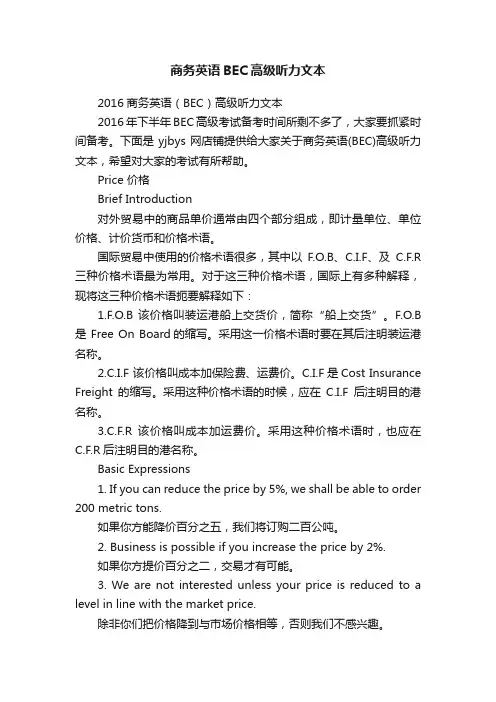
商务英语BEC高级听力文本2016商务英语(BEC)高级听力文本2016年下半年BEC高级考试备考时间所剩不多了,大家要抓紧时间备考。
下面是yjbys网店铺提供给大家关于商务英语(BEC)高级听力文本,希望对大家的考试有所帮助。
Price 价格Brief Introduction对外贸易中的商品单价通常由四个部分组成,即计量单位、单位价格、计价货币和价格术语。
国际贸易中使用的价格术语很多,其中以F.O.B、C.I.F、及C.F.R 三种价格术语最为常用。
对于这三种价格术语,国际上有多种解释,现将这三种价格术语扼要解释如下:1.F.O.B 该价格叫装运港船上交货价,简称“船上交货”。
F.O.B 是 Free On Board的缩写。
采用这一价格术语时要在其后注明装运港名称。
2.C.I.F 该价格叫成本加保险费、运费价。
C.I.F是Cost Insurance Freight的缩写。
采用这种价格术语的时候,应在C.I.F后注明目的港名称。
3.C.F.R该价格叫成本加运费价。
采用这种价格术语时,也应在C.F.R后注明目的港名称。
Basic Expressions1. If you can reduce the price by 5%, we shall be able to order 200 metric tons.如果你方能降价百分之五,我们将订购二百公吨。
2. Business is possible if you increase the price by 2%.如果你方提价百分之二,交易才有可能。
3. We are not interested unless your price is reduced to a level in line with the market price.除非你们把价格降到与市场价格相等,否则我们不感兴趣。
4. We have been informed that the current price on your side is much higher than what you say.我们听说你方的现行价比你方所说的要高很多。
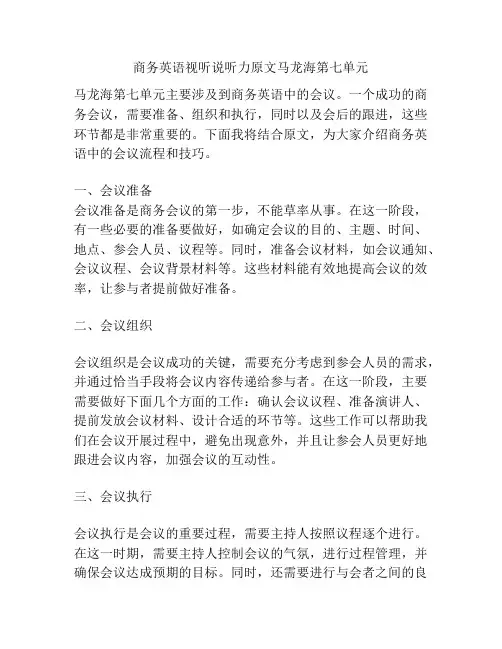
商务英语视听说听力原文马龙海第七单元马龙海第七单元主要涉及到商务英语中的会议。
一个成功的商务会议,需要准备、组织和执行,同时以及会后的跟进,这些环节都是非常重要的。
下面我将结合原文,为大家介绍商务英语中的会议流程和技巧。
一、会议准备会议准备是商务会议的第一步,不能草率从事。
在这一阶段,有一些必要的准备要做好,如确定会议的目的、主题、时间、地点、参会人员、议程等。
同时,准备会议材料,如会议通知、会议议程、会议背景材料等。
这些材料能有效地提高会议的效率,让参与者提前做好准备。
二、会议组织会议组织是会议成功的关键,需要充分考虑到参会人员的需求,并通过恰当手段将会议内容传递给参与者。
在这一阶段,主要需要做好下面几个方面的工作:确认会议议程、准备演讲人、提前发放会议材料、设计合适的环节等。
这些工作可以帮助我们在会议开展过程中,避免出现意外,并且让参会人员更好地跟进会议内容,加强会议的互动性。
三、会议执行会议执行是会议的重要过程,需要主持人按照议程逐个进行。
在这一时期,需要主持人控制会议的气氛,进行过程管理,并确保会议达成预期的目标。
同时,还需要进行与会者之间的良好沟通和协调工作,让与会者相互尊重和支持。
在会议执行阶段中还要做好记录与发布会议决议、工作计划、任务清单等文件。
四、会后跟进会后的跟进是商务会议的最后一步骤,需要及时出具会议纪要和决议,并依据决议确定的任务,进行相应的行动。
这时候,注重与会者之间的合作,为实现会议议程制定相应的计划、评估实现情况、以及做好下一步的准备工作。
通过会后跟进,可以提高会议的效率,并促进企业的发展和成长。
以上是商务英语中的会议流程和技巧。
在参加商务会议时,切记要仔细做好准备和组织工作,让会议达到预期目标,提高会议的效率和成功率。
通过了解这些技巧,我们可以在商务会议中更加自信、果断和高效地发挥作用,让自己的意见得到更好的表达和执行,为企业的发展创造更大的价值。
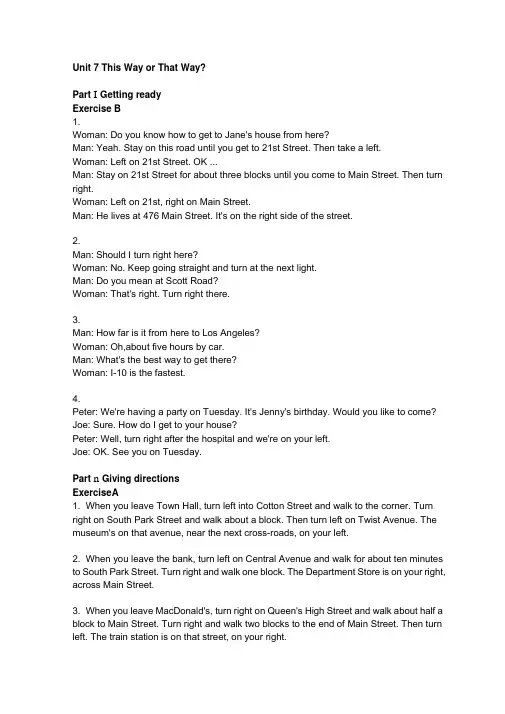
Unit 7 This Way or That Way?Part I Getting readyExercise B1.Woman: Do you know how to get to Jane's house from here?Man: Yeah. Stay on this road until you get to 21st Street. Then take a left.Woman: Left on 21st Street. OK ...Man: Stay on 21st Street for about three blocks until you come to Main Street. Then turn right.Woman: Left on 21st, right on Main Street.Man: He lives at 476 Main Street. It's on the right side of the street.2.Man: Should I turn right here?Woman: No. Keep going straight and turn at the next light.Man: Do you mean at Scott Road?Woman: That's right. Turn right there.3.Man: How far is it from here to Los Angeles?Woman: Oh,about five hours by car.Man: What's the best way to get there?Woman: I-10 is the fastest.4.Peter: We're having a party on Tuesday. It's Jenny's birthday. Would you like to come? Joe: Sure. How do I get to your house?Peter: Well, turn right after the hospital and we're on your left.Joe: OK. See you on Tuesday.Part n Giving directionsExerciseA1. When you leave Town Hall, turn left into Cotton Street and walk to the corner. Turn right on South Park Street and walk about a block. Then turn left on Twist Avenue. The museum's on that avenue, near the next cross-roads, on your left.2. When you leave the bank, turn left on Central Avenue and walk for about ten minutes to South Park Street. Turn right and walk one block. The Department Store is on your right, across Main Street.3. When you leave MacDonald's, turn right on Queen's High Street and walk about half a block to Main Street. Turn right and walk two blocks to the end of Main Street. Then turn left. The train station is on that street, on your right.4.David: Hello? 6939822.Paul: Hello? Can I speak to David, please?David: This is David speaking. Who's that?Paul: David, this is Paul.David: Hello, Paul. How are you?Paul: Fine, thanks, but I can't remember how to get to your house.David: Where are you now?Paul: I'm phoning from the Post Office.David: South Park Street or Queen's High Street? Paul: Queen's High Street. I don't know which bus to take.David: Take a number six (bus) from the terminus. It goes to Portland Plaza. Paul: Where's the terminus?David: Turn right outside the Post Office and walk past the Twist Avenue until you reach the Big Church. The bus terminus is opposite the Church on your right. Paul: Thanks very much. See you soon. Goodbye.5.Tourist: Excuse me.Jane: Yes?Tourist: Can you tell me the way to the Art Gallery, please?Jane: Certainly. Go out of the Agency, turn right, and go along Main Street. Tourist: Along Main Street.Jane: Yes, and turn right at the Hilton Hotel.Tourist: Right at the Hilton.Jane: Then go up Queen's High Street past the Grand Cinema.Tourist: The Grand Cinema.Jane: Yes. Then cross the road at the next traffic lights. The Art Gallery is straight ahead, on your right. You can't miss it.Tourist: That's very kind of you. Thank you. Er ... have you got a pencil? (Do you have a pencil?) Jane: Yes. Why?Tourist: Can you repeat all that? I think I'd better write it down.Part 川Route 66Exercise AThe idea for Route 66 started in the state of Oklahoma. Citizens wanted to link their state with states to the east and west. By the 1920s, Federal officials wanted to connect state roads to provide a shorter, faster way across the country. So a plan was developed to connect existing state roads into one long national road.United States Highway 66 opened in 1926. It was one of America's first national road systems. It crossed eight American states. It was three thousand eight hundred kilometers long.People soon began calling Route 66“the Main Street of America”. It became themost famous road in America. The road traveled through the centers of many American cities and towns. It crossed deserts, mountains, valleys and rivers.In the 1960s, the Federal Government began building huge road systems through a number of states. Cars and trucks could travel at very high speeds. People started driving on these new interstate highways instead of on Route 66. In 1962 parts of Route 66 were closed because they were in bad condition. Then in 1985, Route 66 was officially removed from the national highway system.During the past few years, however, people living near the old Route 66 have formed organizations. They have succeeded in saving parts of the road. They also are saving parts of the road. They also are saving hundreds of eating places, places to stay and interesting places to visit along the way.Exercise CNow it is our turn to take a trip on Route 66. We will have to search for it at times. Many parts of it have new names or numbers. Some parts of it are included in other interstates highways.Our trip begins in Chicago, Illinois. Chicago is America's third largest city. It has almost million people. From Chicago, the road goes through many small towns in Illinois. One of them is Springfield, the home of America's sixteenth president, Abraham Lincoln.Now we drive through Saint Louis, Missouri, a city of nearly four-hundred thousand people. Saint Louis is called“the Gateway to the Wes”t . Missouri has many natural wonders. One if the most famous on Route 66 is Meramec Caverns in Stanton.Next, we drive for a very short time through the state of Kansas. Then we enter the states of Oklahoma. Oklahoma remains the heart and soul of Route 66. That is because more kilometers of the road are in Oklahoma than in any other state.In Claremore, Oklahoma, a statue honors a famous American, Will Rogers. Rogers was born in Claremore. He became the most popular actor in Hollywood in the 1930s. We pass through many historic towns in Oklahoma. In Oklahoma City, we can visit the National Cowboy Hall of Fame and Western Heritage Center. And in Clinton, we can see the new Route 66 Museum. It is the first official museum that tells the complete history of the road and its importance to America.Now we drive through the northern part of the sate of Texas. We stop near the worn of Amarillo to look at an unusual kind of art that celebrates Route 66. It is called “Cadillac Ranch”.A Cadillac is a large, costly American automobile. “Cadillac Ranch”has ten Cadillac cars half buried in the ground. Stanley Marsh, a rich farmer and art collector, create it to honor America's roads.Continuing west, we travel through the states of New Mexico and Arizona. We pass through some of the most beautiful country in the southwest. Petrified Forest National Park is one of the wonders of Arizona. Trees that are hundreds of years old have been turned to stone in unusual shapes. North of Route 66 is the Painted Desert. It is named for the colorful red and yellow sand and rocks.We continue on our trip. We arrive at the town of Oatman, Arizona. Long ago, Oatma was a rich gold-mining town. But everyone left the town when the mining ended. TodayOatman still looks like it did in the past.Now we enter the state of California. We pass through the Mohave Desert, some mountains and several interesting towns. But Route 66 becomes lost among the large roads systems of Los Angeles. This “Main Street of America”ends at the Pacific Ocean in Santa Monica.Part IV More about the topic: Automobiles in the USAThe United States is full of automobiles. There are still families without cars, but some families have two or even more. However, cars are used for more than pleasure. They are a necessary part of life.Cars are used for business. They are driven to offices and factories by workers who have no other way to get to their jobs. When salesmen are sent to different parts of the city, they have to drive in order to carry their products. Farmers have to drive into the city in order to get supplies.Sometimes small children must be driven to school. In some cities school buses are used only when children live more than a mile from the school. When the children are too young to walk that far, their mothers take turns driving them to school. One mother drives on Mondays, taking her own children and the neighbours' children as well. Another mother drives on Tuesdays, another on Wednesdays, and so on. This is called forming a car pool. Men also form car pools, with three or four men taking turns driving to the place where they all work.More car pools should be formed in order to put fewer automobiles on the road and to use less gasoline. Parking is a great problem, and so is the traffic in and around cities. Too many cars are being driven. Something will be done about the use of cars.Part V Memory test: Reading MapsExercise A1. Walk down Green Street for two blocks. Turn right and the bank is the third building on the left side.2. Go straight down Yellow Street until Blue Street. The school is on the corner of Yellow Street and Blue Street.3. Drive along Green Street to White Street and turn right. Then go straight one block, cross Brown Street, and the library is the first building on the right corner.4. Go down Yellow Street for one block, turn left, and then go to the first intersection. Keep going straight, and the hotel is the second building on the left.5. Walk along Green Street until Black Street. Turn right and go straight, and the church is the last building at the end of the street on the left.Exercise BA policeman stands on the corner of Grand Avenue and Main Street. Throughout the day he is asked to give directions. Listen to some of the exchanged carefully and mark on the map each place that is mentioned.1.Man: Excuse me, officer. Can you direct me to Youn'gs Shoe Store?Policeman: Certainly. Go straight up this street for two blocks. There 's a traffic light there. Turn right. It's in the middle of the block on the left. You can't miss it.Man: Thank you.Policeman: You're very welcome.2.Woman: I beg your pardon. I'm stranger here. Can you tell me how to get the post office? Policeman: Yes, it's right over there. You can see it from here. I'ts that red building on the road the other side of the street.Woman: Oh, thank you very much.Policeman: Don't mention it.3.Woman: Do you know where the Palace Restaurant is?Policeman: Yes, it's next to the theater and opposite the drugstore. You c'atnmiss it.4.Man: How far is it to the hospital?Policeman: It 's not fat. Walk west on Grand Avenue until you come to Pine Street. That's about four or five blocks. Turn right on Pine and go two blocks. You'll be able to see the hospital then.Man: Thank you very much.Policeman: Not at all.5.Woman: Do you know where Mercer's Jewelry Store is?Policeman: Yes, it's in the 300 block on Cedar Street.Woman: How do I get there?Policeman: Walk over one block to Cedar Street. Turn left there and go two blocks. Mercer's is in the next block. It's either the fourth or fifth store on your left-hand side. Woman: Oh, thank you very much.Man: You're welcome.。
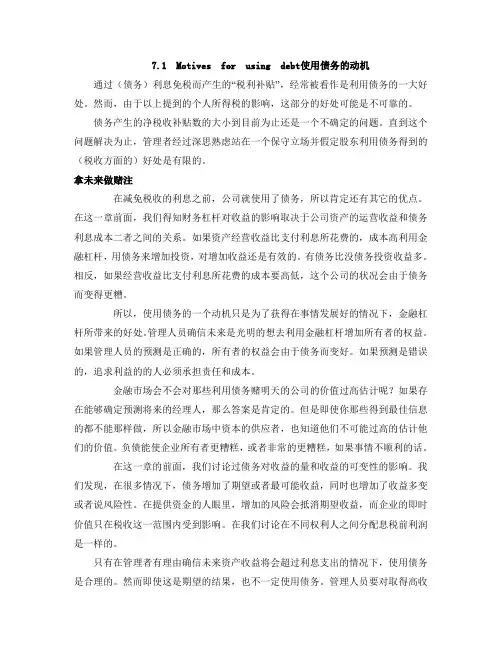
7.1 Motives for using debt使用债务的动机通过(债务)利息免税而产生的“税利补贴”,经常被看作是利用债务的一大好处。
然而,由于以上提到的个人所得税的影响,这部分的好处可能是不可靠的。
债务产生的净税收补贴数的大小到目前为止还是一个不确定的问题。
直到这个问题解决为止,管理者经过深思熟虑站在一个保守立场并假定股东利用债务得到的(税收方面的)好处是有限的。
拿未来做赌注在减免税收的利息之前,公司就使用了债务,所以肯定还有其它的优点。
在这一章前面,我们得知财务杠杆对收益的影响取决于公司资产的运营收益和债务利息成本二者之间的关系。
如果资产经营收益比支付利息所花费的,成本高利用金融杠杆,用债务来增加投资,对增加收益还是有效的。
有债务比没债务投资收益多。
相反,如果经营收益比支付利息所花费的成本要高低,这个公司的状况会由于债务而变得更糟。
所以,使用债务的一个动机只是为了获得在事情发展好的情况下,金融杠杆所带来的好处。
管理人员确信未来是光明的想去利用金融杠杆增加所有者的权益。
如果管理人员的预测是正确的,所有者的权益会由于债务而变好。
如果预测是错误的,追求利益的的人必须承担责任和成本。
金融市场会不会对那些利用债务赌明天的公司的价值过高估计呢?如果存在能够确定预测将来的经理人,那么答案是肯定的。
但是即使你那些得到最佳信息的都不能那样做,所以金融市场中资本的供应者,也知道他们不可能过高的估计他们的价值。
负债能使企业所有者更糟糕,或者非常的更糟糕,如果事情不顺利的话。
在这一章的前面,我们讨论过债务对收益的量和收益的可变性的影响。
我们发现,在很多情况下,债务增加了期望或者最可能收益,同时也增加了收益多变或者说风险性。
在提供资金的人眼里,增加的风险会抵消期望收益,而企业的即时价值只在税收这一范围内受到影响。
在我们讨论在不同权利人之间分配息税前利润是一样的。
只有在管理者有理由确信未来资产收益将会超过利息支出的情况下,使用债务是合理的。
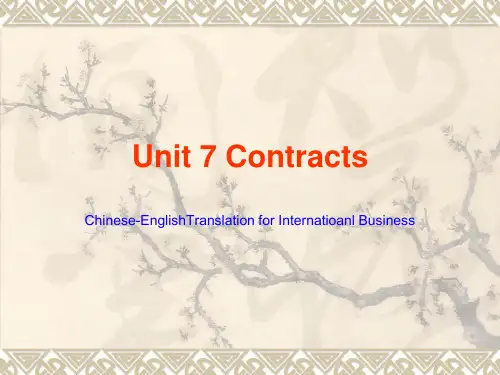
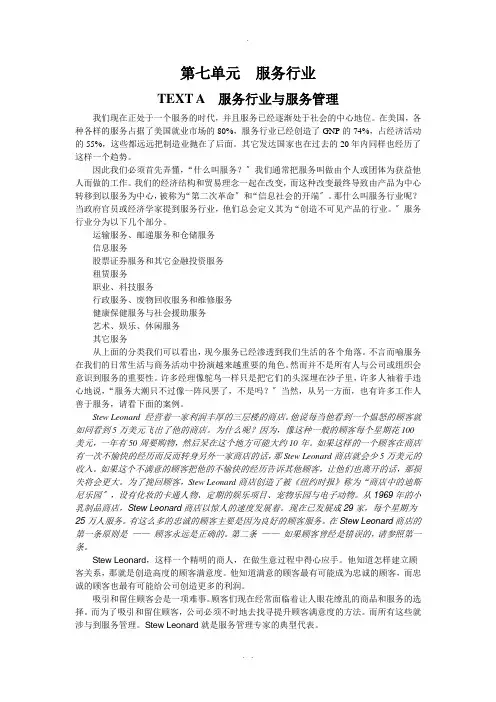
第七单元服务行业TEXT A 服务行业与服务管理我们现在正处于一个服务的时代,并且服务已经逐渐处于社会的中心地位。
在美国,各种各样的服务占据了美国就业市场的80%,服务行业已经创造了GNP的74%,占经济活动的55%,这些都远远把制造业抛在了后面。
其它发达国家也在过去的20年内同样也经历了这样一个趋势。
因此我们必须首先弄懂,“什么叫服务?〞我们通常把服务叫做由个人或团体为获益他人而做的工作。
我们的经济结构和贸易理念一起在改变,而这种改变最终导致由产品为中心转移到以服务为中心,被称为“第二次革命〞和“信息社会的开端〞。
那什么叫服务行业呢?当政府官员或经济学家提到服务行业,他们总会定义其为“创造不可见产品的行业。
〞服务行业分为以下几个部分。
运输服务、邮递服务和仓储服务信息服务股票证券服务和其它金融投资服务租赁服务职业、科技服务行政服务、废物回收服务和维修服务健康保健服务与社会援助服务艺术、娱乐、休闲服务其它服务从上面的分类我们可以看出,现今服务已经渗透到我们生活的各个角落。
不言而喻服务在我们的日常生活与商务活动中扮演越来越重要的角色。
然而并不是所有人与公司或组织会意识到服务的重要性。
许多经理像鸵鸟一样只是把它们的头深埋在沙子里,许多人袖着手违心地说,“服务大潮只不过像一阵风罢了,不是吗?〞当然,从另一方面,也有许多工作人善于服务,请看下面的案例。
Stew Leonard 经营着一家利润丰厚的三层楼的商店。
他说每当他看到一个愠怒的顾客就如同看到5万美元飞出了他的商店。
为什么呢?因为,像这种一般的顾客每个星期花100美元,一年有50周要购物,然后呆在这个地方可能大约10年。
如果这样的一个顾客在商店有一次不愉快的经历而反而转身另外一家商店的话,那Stew Leonard商店就会少5万美元的收入。
如果这个不满意的顾客把他的不愉快的经历告诉其他顾客,让他们也离开的话,那损失将会更大。
为了挽回顾客,Stew Leonard商店创造了被《纽约时报》称为“商店中的迪斯尼乐园〞,设有化妆的卡通人物、定期的娱乐项目、宠物乐园与电子动物。
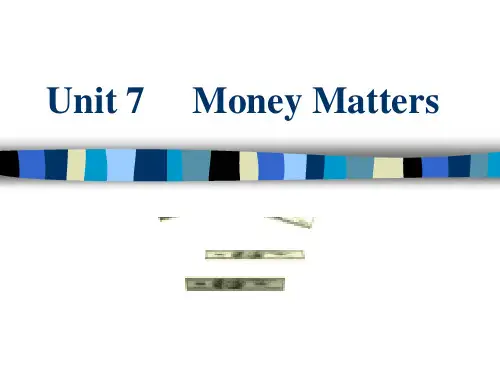
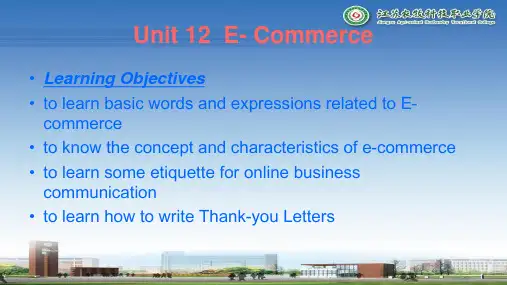
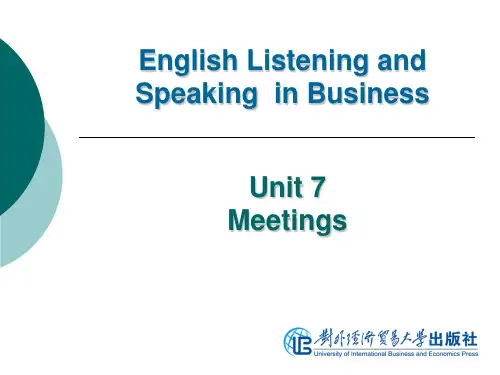
人教7下Units7-12的Section A 2b和2d及Section B 1d和2b教材听力对话课文配套训练Unit 7I. 听力录音两遍听Section A 2b,完成下列第1、2小题。
1. How is the weather today?A. Cold.B. Cloudy.C. Sunny.2. What is Jeff doing?A. Playing basketball.B. Watching TV.C. Playing computer games.听Section B 1d,完成下列第3-5小题。
3. What is Eric doing?A. Having a party.B. Visiting his grandmother.C. Playing games.4. How is the weather in Mexico?A. Cold and rainy.B. Dry and rainy.C. Hot and dry.5. How’s it going with Mary?A. Great.B. Not bad.C. Terrible.II. 阅读Section A 2d的对话,根据对话内容在短文横线处填入一个正确的单词形式。
Rick is 1._________ with Steve on the phone. Rick says the weather is 2._________. Steve is playing 3._________ with some friends at the 4.________ and he is really having a good5.________. Rick’s6._______ isn’t at home. He is studying at his7.________ home. Rick can takea 8.________ for his brother. “Just tell him to 9._______ me back.” Rick says, “No 10.________.”III. 阅读Section B 2b的课文,根据课文内容在横线上填入所缺的单词。
Unit 7 This Way or That Way?PartⅠGetting readyExercise B1.Woman: Do you know how to get to Jane's house from here?Man: Yeah. Stay on this road until you get to 21st Street. Then take a left. Woman: Left on 21st Street. OK ...Man: Stay on 21st Street for about three blocks until you come to Main Street. Then turn right.Woman: Left on 21st, right on Main Street.Man: He lives at 476 Main Street. It's on the right side of the street.2.Man: Should I turn right here?Woman: No. Keep going straight and turn at the next light.Man: Do you mean at Scott Road?Woman: That's right. Turn right there.3.Man: How far is it from here to Los Angeles?Woman: Oh,about five hours by car.Man: What's the best way to get there?Woman: I-10 is the fastest.4.Peter: We're having a party on Tuesday. It's Jenny's birthday. Would you like to come? Joe: Sure. How do I get to your house?Peter: Well, turn right after the hospital and we're on your left.Joe: OK. See you on Tuesday.PartⅡGiving directionsExercise A1. When you leave Town Hall, turn left into Cotton Street and walk to the corner. Turn right on South Park Street and walk about a block. Then turn left on Twist Avenue. The museum's on that avenue, near the next cross-roads, on your left.2. When you leave the bank, turn left on Central Avenue and walk for about ten minutes to South Park Street. Turn right and walk one block. The Department Store is on your right, across Main Street.3. When you leave MacDonald's, turn right on Queen's High Street and walk about half a block to Main Street. Turn right and walk two blocks to the end of Main Street. Then turn left. The train station is on that street, on your right.4.David: Hello? 6939822.Paul: Hello? Can I speak to David, please?David: This is David speaking. Who's that?Paul: David, this is Paul.David: Hello, Paul. How are you?Paul: Fine, thanks, but I can't remember how to get to your house.David: Where are you now?Paul: I'm phoning from the Post Office.David: South Park Street or Queen's High Street?Paul: Queen's High Street. I don't know which bus to take.David: Take a number six (bus) from the terminus. It goes to Portland Plaza.Paul: Where's the terminus?David: Turn right outside the Post Office and walk past the Twist Avenue until you reach the Big Church. The bus terminus is opposite the Church on your right.Paul: Thanks very much. See you soon. Goodbye.5.Tourist: Excuse me.Jane: Yes?Tourist: Can you tell me the way to the Art Gallery, please?Jane: Certainly. Go out of the Agency, turn right, and go along Main Street. Tourist: Along Main Street.Jane: Yes, and turn right at the Hilton Hotel.Tourist: Right at the Hilton.Jane: Then go up Queen's High Street past the Grand Cinema.Tourist: The Grand Cinema.Jane: Yes. Then cross the road at the next traffic lights. The Art Gallery is straight ahead, on your right. You can't miss it.Tourist: That's very kind of you. Thank you. Er ... have you got a pencil? (Do you have a pencil?)Jane: Yes. Why?Tourist: Can you repeat all that? I think I'd better write it down.Part ⅢRoute 66Exercise AThe idea for Route 66 started in the state of Oklahoma. Citizens wanted to link their state with states to the east and west. By the 1920s, Federal officials wanted to connect state roads to provide a shorter, faster way across the country. So a plan was developed to connect existing state roads into one long national road.United States Highway 66 opened in 1926. It was one of America’s first national road systems. It crossed eight American states. It was three thousand eight hundred kilometers long.People soon began calling Route 66 “the Main Street of America”. It became the most famous road in America. The road traveled through the centers of many American cities and towns. It crossed deserts, mountains, valleys and rivers.In the 1960s, the Federal Government began building huge road systems through a number of states. Cars and trucks could travel at very high speeds. People started driving on these new interstate highways instead of on Route 66. In 1962 parts of Route 66 were closed because they were in bad condition. Then in 1985, Route 66 was officially removed from the national highway system.During the past few years, however, people living near the old Route 66 have formed organizations. They have succeeded in saving parts of the road. They also are saving parts of the road. They also are saving hundreds of eating places, places to stay and interesting places to visit along the way.Exercise CNow it is our turn to take a trip on Route 66. We will have to search for it at times. Many parts of it have new names or numbers. Some parts of it are included in other interstates highways.Our trip begins in Chicago, Illinois. Chicago is America’s third largest city. It has almost million people. From Chicago, the road goes through many small towns in Illinois. One of them is Springfield, the home of America’s sixteenth president, Abraham Lincoln.Now we drive through Saint Louis, Missouri, a city of nearly four-hundred thousand people. Saint Louis is called “the Gateway to the West”. Missouri has many natural wonders. One if the most famous on Route 66 is Meramec Caverns in Stanton.Next, we drive for a very short time through the state of Kansas. Then we enter the states of Oklahoma. Oklahoma remains the heart and soul of Route 66. That is because more kilometers of the road are in Oklahoma than in any other state.In Claremore, Oklahoma, a statue honors a famous American, Will Rogers. Rogers was born in Claremore. He became the most popular actor in Hollywood in the 1930s. We pass through many historic towns in Oklahoma. In Oklahoma City, we can visit the National Cowboy Hall of Fame and Western Heritage Center. And in Clinton, we can see the new Route 66 Museum. It is the first official museum that tells the complete history of the road and its importance to America.Now we drive through the northern part of the sate of Texas. We stop near the worn of Amarillo to look at an unusual kind of art that celebrates Route 66. It is called “Cadillac Ranch”.A Cadillac is a large, costly American automobile. “Cadillac Ranch”has ten Cadillac cars half buried in the ground. Stanley Marsh, a rich farmer and art collector, create it to honor America’s roads.Continuing west, we travel through the states of New Mexico and Arizona. We pass through some of the most beautiful country in the southwest. Petrified Forest National Park is one of the wonders of Arizona. Trees that are hundreds of years old have been turned to stone in unusual shapes. North of Route 66 is the Painted Desert. It is named for the colorful red and yellow sand and rocks.We continue on our trip. We arrive at the town of Oatman, Arizona. Long ago, Oatma was a rich gold-mining town. But everyone left the town when the mining ended. Today Oatman still looks like it did in the past.Now we enter the state of California. We pass through the Mohave Desert, some mountains and several interesting towns. But Route 66 becomes lost among the large roads systems of Los Angeles. This “Main Street of America”ends at the Pacific Ocean in Santa Monica.Part IV More about the topic: Automobiles in the USAThe United States is full of automobiles. There are still families without cars, but some families have two or even more. However, cars are used for more than pleasure. They are a necessary part of life.Cars are used for business. They are driven to offices and factories by workers who have no other way to get to their jobs. When salesmen are sent to different parts of the city, they have to drive in order to carry their products. Farmers have to drive into the city in order to get supplies.Sometimes small children must be driven to school. In some cities school buses are used only when children live more than a mile from the school. When the children are too young to walk that far, their mothers take turns driving them to school. One mother drives on Mondays, taking her own children and the neighbours' children as well. Another mother drives on Tuesdays, another on Wednesdays, and so on. This is called forming a car pool. Men also form car pools, with three or four men taking turns driving to the place where they all work.More car pools should be formed in order to put fewer automobiles on the road and to use less gasoline. Parking is a great problem, and so is the traffic in and around cities. Too many cars are being driven. Something will be done about the use of cars.PartⅤMemory test: Reading MapsExercise A1. Walk down Green Street for two blocks. Turn right and the bank is the third building on the left side.2. Go straight down Yellow Street until Blue Street. The school is on the corner of Yellow Street and Blue Street.3. Drive along Green Street to White Street and turn right. Then go straight one block, cross Brown Street, and the library is the first building on the right corner.4. Go down Yellow Street for one block, turn left, and then go to the first intersection. Keep going straight, and the hotel is the second building on the left.5. Walk along Green Street until Black Street. Turn right and go straight, and the church is the last building at the end of the street on the left.Exercise BA policeman stands on the corner of Grand Avenue and Main Street. Throughout the day he is asked to give directions. Listen to some of the exchanged carefully and mark on the map each place that is mentioned.1.Man: Excuse me, officer. Can you direct me to Young’s Shoe Store?Policeman: Certainly. Go straight up this street for two blocks. There’s a traffic light there. Turn right. It’s in the middle of the block on the left. You can’t miss it.Man: Thank you.Policeman: You’re very welcome.2.Woman: I beg your pardon. I’m stranger here. Can you tell me how to get the post office?Policeman: Yes, it’s right over there. You can see it from here. It’s that red building on the road the other side of the street.Woman: Oh, thank you very much.Policeman: Don’t mention it.3.Woman: Do you know where the Palace Restaurant is?Policeman: Yes, it’s next to the theater and opposite the drugstore. You can’t miss it.4.Man: How far is it to the hospital?Policeman: It’s not fat. Walk west on Grand Avenue until you come to Pine Street. That’s about four or five blocks. Turn right on Pine and go two blocks. You’ll be able to see the hospital then.Man: Thank you very much.Policeman: Not at all.5.Woman: Do you know where Mercer’s Jewelry Store is?Policeman: Yes, it’s in the 300 block on Cedar Street.Woman: How do I get there?Policeman: Walk over one block to Cedar Street. Turn left there and go two blocks. Mercer’s is in the next block. It’s either the fourth or fifth store on your left-hand side. Woman: Oh, thank you very much.Man: You’re welcome.。
7 Marketing cm A I really wanted it, but when I tried to buy it, I just couldn't get it anywhere. My friend heard that it was in one shop and he queued up for ages, but they'd run out by lunchtime. B The company held a party on a river boat to launch their new campaign. It was absolutely fantastic. We also got a free gift at the end. C The shoes were really expensive but definitely worth it. I think the fact that they are so expensive really distinguishes them from the competition. D I've had this briefcase for 20 years and it still looks good. The material is high quality and long-lasting.
Q 7.2 (I = Interviewer, MI = Mirjana Ilic) I Miijana, what is the key to successful marketing? Ml Well, the key to successful marketing involves many different things. Most people would say successful marketing is just a good creative campaign. Some people would go further than that and say it involves many good marketing communications, reaching the right people, clear marketing messages, and working well with sales teams to get the right sales channels. But the most common definition of marketing is just two words: customer orientation. What does that actually mean though? It really means four things: producing what customers want, when they want it, at the right price and in a way that's profitable for the company, and I believe in that definition very strongly.
Q 7.3 (I = Interviewer, MI = Mirjana Ilic) I Could you describe a marketing campaign that impressed you? Ml Well, marketing is very much in my blood and it's my first love, so there are lots of campaigns I come across every day that really impress me. But I think the most memorable in recent years has been the Orange mobile phone campaign, partly because the whole area of mobile technologies and mobile communications I find very interesting and incredibly exciting, but partly because it was a great campaign in itself. It has the fantastic strap line 'the future's bright, the future's orange', which is so memorable and so meaningful for all segments of the population.
0 7.4 (I = Interviewer, MI = Mirjana Ilic) 1 Could you give an example of an unsuccessful campaign? Ml Well, I think the most unsuccessful recent campaign for me was the one where an electrical goods manufacturer tried to roll out a very simple sales promotion. Initially, if you bought any electrical appliance over a certain value, you were promised free flights with every purchase. Now, although initially this campaign did seem to be quite successful because sales went up, in the end they had to stop the campaign because they simply couldn't keep up with the demand and they were overspending a lot on these prizes. So I think basically, from the early stages the campaign was badly planned, badly budgeted and it resulted in a lot of negative publicity for the company. ABCDEFGHIJKLMNOPQRSTUVWXYZ Q 7.7 (M = Martin, F = Fiona) F Hello. M Hello, Fiona. This is Martin. How are things going? F Fine, thanks. M I haven't received your sales report yet for the quarter. Any problems? F Oh, no. Sorry, Martin. I've been really busy lately. But I can tell you, we've had excellent results. M Good. F Yeah. We've met our sales targets and increased our market share by two percent. Our total sales were over £1.2 million. M Over 1.2 million. Great! Well done! What about the new range of shampoos? F Well, we had a very successful product launch. We spent £30,000 on advertising it and ... M Sorry, did you say 13,000? F No, 30,000. We advertised in the national press, took out space in trade magazines and did a number of presentations to our distributors. It was money well spent. We've had a lot of orders already and good comments from customers. M I'm really pleased to hear that. O 7.8 (M = Martin, F = Fiona) M Anything else to report? F Yes, there is one thing. One of my biggest customers will be visiting London next week. She'd like to have a meeting with you. M Fine. Could you give me a few details? What's her name? F It's Mrs Young Joo Chan. M Sorry, I didn't catch that. F Young Joo Chan. I'll spell that for you. Y-O-U-N-G J-O-O C-H-A-N. She's Korean actually. She's chief buyer for HDS. Let me give you her telephone number: 82 2 0735 8879. OK? Why not give her a ring? She's expecting to hear from you. M I'll do that. But first, let me read that back to you. It's Young Joo Chan from HDS. Telephone number 82 2 0735 8875. F No, 82 2 0735 8879. M OK, I've got that. Just one more thing. Did she say when she'd like to meet? F Yes, she said next Thursday or Friday - that's the 17th or 18th. M What about Friday the 18th? I'll give her a call. Right, I think that's everything. F Fine. I'll get that report to you by the end of the week. M Right. Bye for now. F Bye.